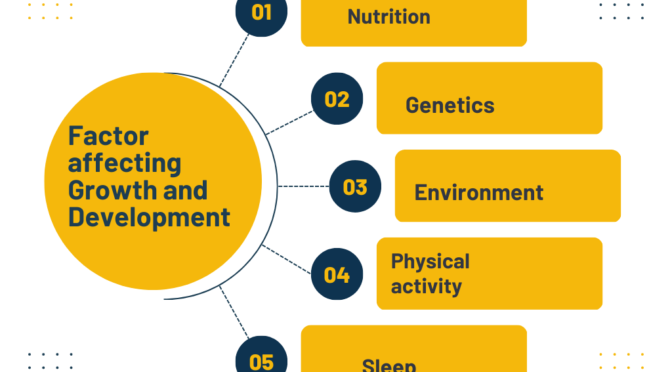Child growth and development are complicated processes impacted by a wide range of circumstances. Understanding these variables is critical for parents, caregivers, and educators in creating a loving environment that promotes healthy growth.Now we’ll look at the major elements that impact kid growth and development.
1. Genetics
Genetics play a significant role in a child’s growth and development. Genetic factors determine physical attributes such as height, weight, and eye color, as well as predispositions to certain health conditions. However, while genetics set the foundation, they interact dynamically with environmental factors.
2. Nutrition
Proper nutrition is fundamental to a child’s physical and cognitive development. A balanced diet rich in essential vitamins, minerals, and nutrients supports brain development, strengthens the immune system, and promotes overall growth. Malnutrition or an imbalanced diet can lead to developmental delays and health issues.
3. Physical Activity
Regular physical activity is essential for healthy growth. Exercise helps build strong bones and muscles, improves cardiovascular health, and supports mental well-being. Encouraging children to engage in physical play and sports can also enhance their social skills and teamwork abilities.
4. Health Care
Access to quality health care is vital for monitoring and supporting a child’s growth and development. Regular check-ups, vaccinations, and timely medical interventions ensure that children grow up healthy and can address any developmental issues early on. Preventive care and health education for parents also play a crucial role.
5. Environmental Factors
The environment in which a child grows up has a profound impact on their development. This includes the physical environment, such as clean air, safe housing, and access to parks, as well as the emotional and social environment, such as family dynamics and community support.
6. Education and Stimulation
Early education and stimulation are critical for cognitive development. Activities that challenge the brain, such as reading, playing educational games, and exploring new environments, help develop cognitive skills. Early childhood education programs provide structured learning experiences that lay the groundwork for future academic success.
Conclusion
Child growth and development are multifaceted processes influenced by a combination of genetic, nutritional, physical, emotional, and environmental factors. By understanding these factors, parents, caregivers, and educators can create supportive environments that promote healthy and holistic development. Every child is unique, and fostering their growth requires a personalized approach that considers all these diverse influences. Through awareness and proactive efforts, we can ensure that every child has the opportunity to reach their full potential.






Comments